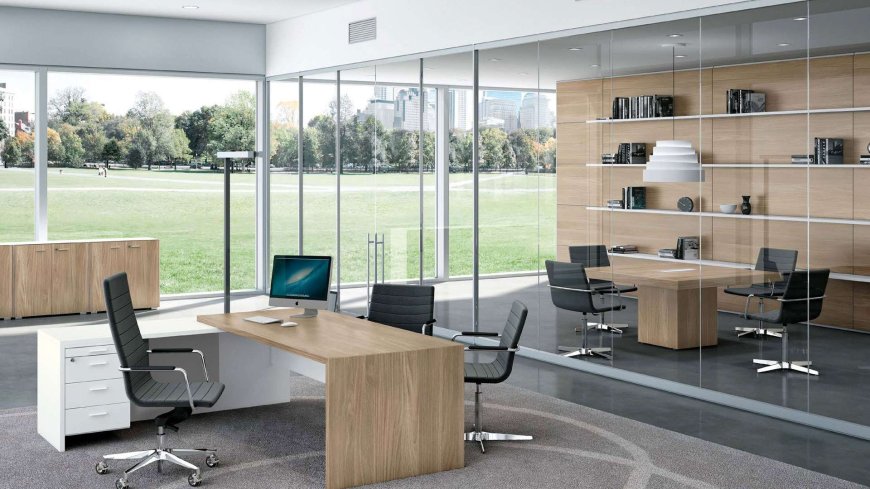The Impact of Office Furniture on Employee Productivity and Morale
This blog breaks down how the right office furniture contributes to productivity and morale.

Most business owners and managers understand the importance of productive, motivated employees. Yet, one of the most overlooked factors influencing daily performance is the very environment people work in particularly the office furniture surrounding them. The design, comfort, and functionality of office spaces play a direct role in employee well-being, focus, and overall job satisfaction.
Why Office Furniture Matters More Than You Realize
The physical workspace has psychological and practical effects on employee behavior. Poorly designed or uncomfortable office furniture can:
-
Lead to discomfort and fatigue
-
Decrease focus and increase distractions
-
Contribute to posture issues and physical health problems
-
Lower morale by signaling a lack of care from management
Conversely, well-planned office furniture improves both the mental and physical aspects of workplace satisfaction.
How Office Furniture Boosts Productivity
1. Ergonomics Reduces Discomfort and Fatigue
Ergonomic chairs, sit-stand desks, and adjustable workstations reduce strain on the body, allowing employees to work comfortably for longer periods.
Key productivity-boosting features:
-
Adjustable lumbar support and seat height
-
Reclining options and tilt tension control
-
Sit-stand functionality for posture variation
-
Wrist supports and monitor risers
2. Encourages Organized, Clutter-Free Workspaces
Modern office furniture includes built-in storage, cable management, and modular layouts, making it easier for employees to stay organized and efficient.
Effective organizational options:
-
Mobile drawer units
-
Desk risers with shelves
-
Vertical filing cabinets
-
Under-desk storage solutions
3. Promotes Collaboration and Focused Work
A flexible office setup, with a combination of private zones and open collaboration areas, encourages productivity by letting employees choose the most suitable environment for their tasks.
Smart furniture options:
-
Modular desks and meeting pods
-
Sound-dampening partitions
-
Moveable whiteboards and display stands
-
Lounge seating for informal idea-sharing
The Psychological Effects of Comfortable Office Furniture
Office furniture influences mood, focus, and morale on a subconscious level.
-
Comfortable seating improves mood and energy
-
Aesthetic, modern furniture fosters pride in the workplace
-
Thoughtfully designed layouts reduce stress and anxiety
-
Flexible spaces give employees a sense of control over their environment
Even small upgrades like adding ergonomic chairs or updating communal areas can make noticeable differences in employee attitude and engagement.
Signs Your Office Furniture May Be Hurting Productivity
-
Increased complaints of back or neck pain
-
High employee turnover or low job satisfaction scores
-
Cluttered, disorganized work areas
-
Difficulty attracting and retaining talent
-
Frequent downtime due to equipment issues or discomfort
If these issues sound familiar, its time to rethink your office furniture choices.
Best Office Furniture Features for High-Performance Workspaces
1. Ergonomic Chairs
Look for adjustable height, lumbar support, armrests, and breathable fabrics.
2. Sit-Stand Desks
Promote movement throughout the day and reduce sedentary fatigue.
3. Mobile Storage Solutions
Flexible storage keeps supplies organized while making it easy to reconfigure layouts.
4. Modular Workstations
Adaptable desks and tables that can be arranged for individual focus or team projects.
5. Collaborative Lounge Furniture
Soft seating, ottomans, and nesting tables encourage informal meetings and quick brainstorming sessions.
Benefits of Upgrading Office Furniture for Employees
-
Fewer work-related aches and injuries
-
Increased concentration and output
-
Higher job satisfaction and morale
-
Improved office appearance and functionality
-
Enhanced company reputation and employee retention
Comfortable, attractive office furniture sends a strong message about valuing your teams well-being.
Tips for Selecting Productivity-Boosting Office Furniture
-
Prioritize ergonomics for all seating and work surfaces
-
Choose modular, multi-functional pieces for flexibility
-
Plan for adequate storage and organization
-
Create a mix of open-plan and private work areas
-
Opt for light, neutral colors to create an uplifting environment
-
Involve employees in selection and layout planning
Your office furniture should evolve alongside your teams needs.
FAQs About Office Furniture and Workplace Productivity
Q1: Does office furniture really affect productivity?
Yes comfortable, ergonomic, and well-organized office furniture directly impacts physical comfort, mental focus, and workflow efficiency.
Q2: How often should office furniture be updated?
Review furniture condition and employee feedback every 35 years, or sooner if discomfort or workflow issues arise.
Q3: Can small businesses benefit from ergonomic office furniture?
Absolutely. Even a few ergonomic chairs and desks can significantly improve employee well-being and job satisfaction.
Q4: What is the most important piece of office furniture to invest in?
Ergonomic chairs offer the greatest health and productivity benefits since most employees spend hours seated.
Q5: How do I create collaborative spaces without a big renovation?
Use modular lounge furniture, movable whiteboards, and foldable tables to set up informal collaboration areas as needed.
Final Thoughts
Your workspaces physical environment has a far-reaching impact on how employees feel and perform. Investing in modern, ergonomic, and thoughtfully arranged office furniture enhances productivity, improves morale, and reflects a forward-thinking company culture. By prioritizing comfort, flexibility, and organization, youll create an environment where your team feels supported, motivated, and equipped to do their best work.




























